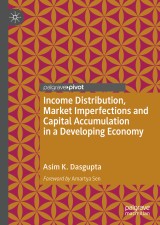Details

Income Distribution, Market Imperfections and Capital Accumulation in a Developing Economy
|
53,49 € |
|
| Verlag: | Palgrave Pivot |
| Format: | |
| Veröffentl.: | 13.11.2018 |
| ISBN/EAN: | 9789811316333 |
| Sprache: | englisch |
Dieses eBook enthält ein Wasserzeichen.
Beschreibungen
<p></p><p>The book explains the problem of insufficient capital accumulation and growth in a less developed country. In conventional analyses, such explanations are often found exogenised in terms of factors such as socio-cultural attitudes towards saving and investment, irrationality of peasant behaviour, technological aspects of externalities and demographic parameters. This book provides an alternative explanation in terms of distribution of income and assets.</p>
<p>Focusing on the agricultural sector of a developing economy, it describes how this approach can be extended to cover the industrial sector as well. Further, it develops a model that is then used to analyse the specific problem of capital accumulation in agriculture.</p><br><p></p>
<p>Focusing on the agricultural sector of a developing economy, it describes how this approach can be extended to cover the industrial sector as well. Further, it develops a model that is then used to analyse the specific problem of capital accumulation in agriculture.</p><br><p></p>
<b>Introduction</b>.- <b>Chapter 1</b>: Characteristics of the Economy.- <b>Chapter 2</b>: The Model.- <b>Chapter 3</b>: Behaviour of the System over Time.- <b>Chapter 4</b>: Significance of the Distribution of Income and Structure of Credit Market.- <b>Chapter 5</b>: Different Ways of Resolving the Crisis.- <b>Chapter 6</b>: Some Other Results in the Literature.- <b>Chapter 7</b>: Generalisations.
<div><div><p><b>Professor Asim K. Dasgupta</b> was Minister of Finance (1987-88 to 2010-11) in the Government of West Bengal, India. He received his Ph.D in Economics with a Widrow Wilson Fellowship at Massachusetts Institute of Technology (M.I.T.), USA in 1975. He also taught at the College of Business Administration, Boston University (1973-74) and at the Department of Economics, University of Calcutta, India.</p><br></div></div>
Shows the importance of distribution of assets and incomes in explaining the problem of insufficient capital accumulation and growth in an underdeveloped economy Focuses on the significance of political-economic factors, along with conventional issues, such as those related to technical progress and the vicious cycle of poverty Explains how it is possible to develop a more comprehensive package of policies in which Government and NGOs can fruitfully intervene

















